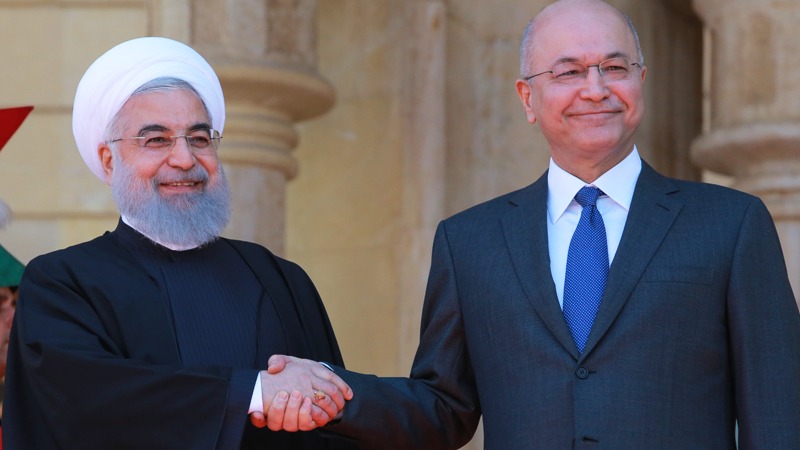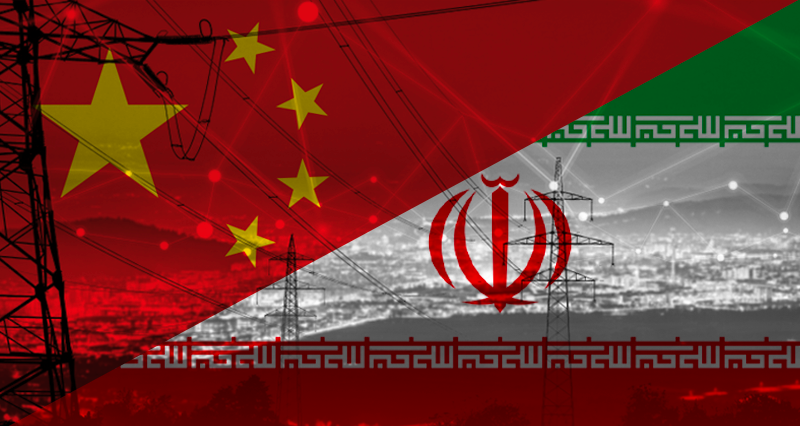A couple of months ago, President Trump visited Iraq by the cover of darkness, and, as he claimed in one of his interviews, the Americans actually had to shut off all the lights so that no one could recognize him, fearing for his safety.
Though the US has invaded Iraq and still has many military bases in the country, the fact that President Trump only visited the massive Marine-guarded Ain Al-Assad Air Base still wasn’t seen as enough to ensure he would be kept safe.
Trump visited this base for three hours and then immediately left Iraq without meeting or even informing any Iraqi official about his visit, and probably for a good reason.
President Rouhani, on the other hand, visited Iraq in the middle of the day, traveled to different places and cities and met many Iraqi officials as well as politicians and even tribe leaders.
The American Embassy in Baghdad is situated in the green zone, but no American diplomat dares to walk around there without an escort. The Iranian Embassy is not in the green zone, and yet Iranian diplomats walk in the streets of Baghdad and many other Iraqi cities, freely mixing with the people.
As the Iranian Foreign Minister, Dr. Mohammad Javad Zarif, said in Munich Conference: “In Iraq, the US invaded the land but Iran invaded hearts…” it seems that Rouhani wanted to prove this with his visit.
Rouhani leads a group of politicians in Iran who believe that the only way to solve the country’s problems is through resolving disputes between Iran and the west (particularly the US), and if these debates are not solved, Iran’s issues with neighboring countries will also suffer.
That is why President Rouhani’s government has focused on improving relations with western countries since the first day he came into office.
After Mr. Zarif’s resignation as Foreign Minister, it has been an open secret that the Iraqi political file, as well as the political files of Syria and Lebanon and many other regional countries, are under the control of the Revolutionary Guard, and that the country has already built meaningful relationships they can rely on.
Rouhani’s visit and the visit of President Bashar Al-Assad to Tehran just a couple of weeks before is proof of the success of their efforts.
This is President Rouhani’s second visit to Iraq since he was elected five years ago, but there is a big difference this time: now, he has expectations he couldn’t have had the first time.
Rouhani hopes that he can build a network of neighboring allies to help break American sanctions, and, if this happens, he could be more certain that his government will be able to meet Washington’s challenge.
While Rouhani’s allies were counting on European countries to provide a solution to thwart President Trump’s decisions, the European INSTEX turned out to be a complete disappointment and the Iranian government had to shift to plan B.
Iranians have good relations with neighboring countries such as Turkey, Iraq, Afghanistan, Pakistan, Azerbaijan, Armenia, Turkmenistan, Oman and Kuwait who can all play a role in facilitating trade with Iran.
After all, everyone knows the main reason Dubai became what it is today, is that it was once a hub for trade with Iran.
Turkish President Recep Tayyip Erdogan has plainly announced that Turkey will not abide by the American sanctions against Iran and only abides by UN Security Council decisions.
Due to US bullying, it is hard to believe that one country could stand up against Washington’s decisions, and of course, Turkey itself has faced sanctions and may not be ready to face new economic challenges brought about by defying the US.
Therefore, the best way forward is to convince several regional countries to join the campaign.
Economically, Iraq is the best choice for Iran, since their trade with Tehran amounts to around 12 billion dollars and, unofficially, it is likely twice that amount.
If Iraq accepts, and it seems Iraqi officials already have, the trade between Iran and Iraq has the ability to reach more than 20 billion dollars officially.
Considering the trade agreements Iran has with Turkey and other regional countries, increased trade with the Iraqis could be enough to cover the needs of the Iranian people in spite of sanctions.
President Rouhani has been demanding the removal of visa requirements for Iranians so they can go to Iraq and buy the goods they need as well as engage in religious tourism, which could raise the amount of unofficial trade between the two countries to twice what it is right now, but Iraqi officials had been hesitant due to American and Saudi pressure. Nonetheless, they have now promised to facilitate Iranian tourists visits to Iraq.
Another of President Rouhani’s goals in his visit was establishing common free trade and Industrial zones between Iran and Iraq where Iranians could establish industry and trade with other countries on Iraqi soil, and thus circumvent American sanctions.
Of course, the visit would not be complete without some kind of agreement being reached on building roads and railroads between the two countries, which could then reach the Mediterranean Sea after passing through Syria and Lebanon, starting in the Iranian Chabahar port on the Indian ocean. This agreement could change the strategic, economic and geopolitical situation of all four of these countries and perhaps the entire region.
The final thing Rouhani is hoping to achieve is a guarantee from the Iraqi side that their soil would not be used as a base for the Americans to spy on Iran or even launch an attack against them.
The Iraqis are ready to play a mediator role between Iran and Saudi Arabia, and, according to some sources, the Iranian President told the Iraqis that he welcomes someone facilitating relations.

















Leave a Reply